2-2 Assistance for Ensuring Peace, Stability, and Security
(1) Support for Peacebuilding and Refugees/Internally Displaced Persons
Regional and internal conflicts arising from ethnic, religious, and historical differences continue to pose challenges for the international community. Such conflicts generate a great number of refugees and internally displaced persons (IDPs), resulting in humanitarian crises and violations of human rights. Furthermore, these conflicts undermine the progress in development achieved through long-term efforts, and cause massive economic losses. Therefore, it is important for the entire international community to engage in “peacebuilding” for the establishment of foundations for development in order to prevent conflicts, avoid their recurrence, and consolidate sustainable peace.
<Japan's Efforts>
Discussions on integrated support from the resolution of conflicts to recovery, reconstruction and nation-building have been held in fora such as the United Nations Peacebuilding Commission, which was established in 2005. To date, Japan has contributed $48.5 million to the Peacebuilding Fund. Furthermore, Japan is making vigorous efforts from the perspective of “Proactive Contribution to Peace” based on the principle of international cooperation. Japan utilizes the United Nations to reaffirm the importance of peacebuilding at high-level. In 2016, then Foreign Minister Kishida chaired an Open Debate of the UN Security Council held in New York, on the theme of “Peacebuilding in Africa.” Japan stated, in the Pledging Conference for the UN Peacebuilding Fund, that Japan would contribute about $10 million in the coming years. In addition, since April 2017, Japan has taken the lead in discussions as the focal point on the institution-building at the Peacebuilding Commission,
Furthermore, Japan provides various types of support, including assistance for refugees affected by conflict, food assistance, and electoral assistance for political peace processes. After a conflict is resolved, Japan assists in Disarmament, Demobilization and Reintegration (DDR) of ex-combatants in order to promote the consolidation of peace. Japan also provides support to rebuild the security sector to ensure domestic stability and security. Japan extends support for the reconstruction of affected countries in such areas as the repatriation and resettlement of refugees and IDPs, and the rebuilding of basic infrastructure (socio-economic infrastructure). Furthermore, in order to consolidate sustainable peace and prevent the recurrence of conflicts, Japan engages in efforts in social sectors such as healthcare and education as well as the reinforcement of administrative, judicial, and police functions, and the development of economic infrastructure and institutions. In such undertakings, maximum consideration is given to the importance of the roles that women can play in peacebuilding. In order to provide these support in a seamless manner, Japan also extends bilateral assistance through international organizations, along with grant aid, technical cooperation, and ODA loans.
The Development Cooperation Charter outlines that Japan will strengthen coordination between development cooperation and international peace cooperation activities such as UN peacekeeping operations (PKOs). In the fields where UN PKOs are deployed, many initiatives are underway which contribute to development, including efforts for protecting refugees, women, and children affected by conflict and developing basic infrastructure. To maximize the effects of such efforts, it remains important for Japan to promote such forms of cooperation.
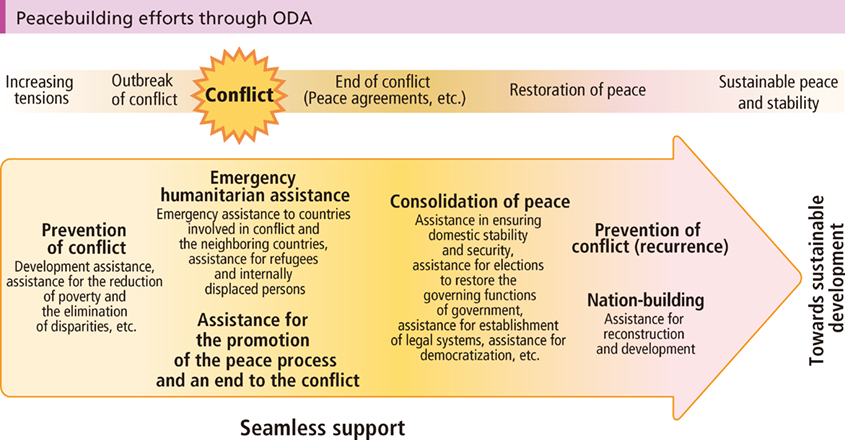
•Palestine
Improvement of Quality of Education for Palestinian Primary Schools
Strengthening Resilience for the Vulnerable People Affected by the War
Grant Assistance for Japanese NGO Projects (March 2016 - ) Japan Platform Project (May 2016 - )
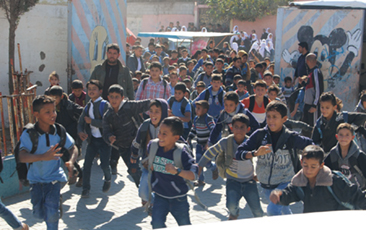
Children leaving Ṭāriq ibn Ziyād Elementary School for the day (Photo: CCP Japan)
Many vulnerable people in the Gaza Strip of Palestine have been living in poverty caused by the economic blockade lasting more than 10 years as well as the summer 2014 Gaza conflict.
Campaign for Children of Palestine (CCP) Japan, a Japanese NGO that has provided assistance in Palestine for many years, is now providing supplementary classes, training teachers, and developing teaching materials at public elementary schools and children's centers in order to enhance the quality of primary education and improve the basic academic skills of children in the Gaza Strip. Supplementary classes covering Arabic, English, arithmetic and science emphasize a fun learning environment instead of cramming. Besides, there is an opportunity for children to enjoy recreational activities, which release them from stress in their daily life. All in all, this assistance has greatly contributed to the children's healthy growth and academic progress.
CCP Japan also carries out a number of activities as part of its humanitarian assistance after the conflict in 2014. These include: the distribution of emergency relief goods to families affected; medical assistance, such as in-home medical examinations and rehabilitation equipment; providing a place for children and youth and offering mental health support to them; and carrying out lifestyle improvement projects, such as roadway cleaning and assisting farming. The distribution of goods and roadway cleaning are participated by Palestinian youth, which encourages them to play a more active role in their community.
Together with these projects, CCP Japan has been promoting awareness activities on the early detection and treatment of breast cancer and providing mental health support for patients of breast cancer in cooperation with the United Nations Population Fund (UNFPA). In this manner, CCP Japan's activities in Palestine involve a combination of assistance. (As of December 2017)
•Support for Refugees and Internally Displaced Persons (IDPs)
Given the situations in Syria and other countries, the number of refugees and IDPs worldwide at the end of 2016 reached its highest level since the end of World War II, and humanitarian conditions are becoming increasingly severe. From the viewpoint of human security, Japan is providing humanitarian assistance to refugees and IDPs, in order to ensure the life, dignity, and security of the people in the most vulnerable positions, and to help each person get back on their feet and become self-reliant.
Specifically, Japan works with international organizations mainly UNHCR and the International Organization for Migration (IOM) to continuously provide refugees and IDPs around the world with assistance by distributing food, shelter and basic living supplies. In cooperation with the World Food Programme (WFP), United Nations Relief and Works Agency for Palestine Refugees in the Near East (UNRWA), International Committee of the Red Cross (ICRC) and other international institutions, Japan provides assistance for refugees and others while utilizing the expertise and coordinating abilities of these institutions, even in locations under dangerous public safety conditions.
When providing assistance for refugees through international organizations, Japan strives to ensure the visibility of its assistance by collaborating with JICA, Japan's development cooperation implementing agency, as well as private companies. For example, Japan implements refugee assistance through UNHCR in collaboration with JICA, in order to provide seamless assistance by coordinating emergency and reconstruction assistance.
In addition, the specified non-profit corporation Japan Platform (JPF), an emergency humanitarian aid organization established in 2000 through a partnership among NGOs, the Government of Japan, and the business communities (see “C. Financial cooperation for NGO projects”), is providing support for refugees and IDPs. In FY2016, Japan provided assistance for Humanitarian Response Programs to Yemen, Syria and Iraq, the Palestine/Gaza and South Sudan.
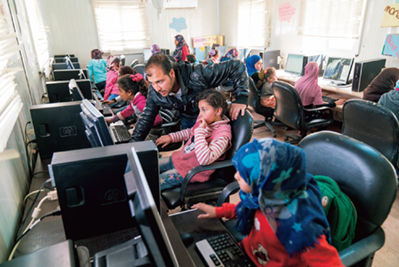
Child refugees from Syria participating in a computer class operated by the UN Women Azraq refugee camp (Photo: Christopher Herwig / UN Women)
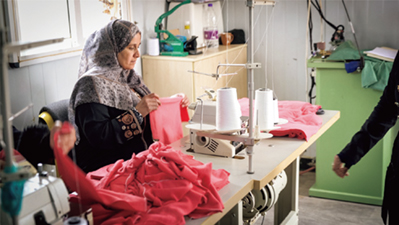
A Female refugee from Syria engaged in sewing work at a women's refugee support center in the eastern part of Jordan, operated by the UN Women Azraq refugee camp (Photo: Christopher Herwig / UN Women)
Japan pledged at the Supporting Syria and the Region conference held in London in 2016 and has swiftly provided the support of approximately $350 million. This assistance is, firstly, inclusive in order to prevent specific groups from becoming alienated and radicalized, and secondly, necessary to reduce the burden on host countries while offering hope to Syrians for the future reconstruction of their country through strengthening humanitarian development nexus. Based on this approach, it includes such as vocational training for women and youth. The total amount of assistance Japan provided to Syria, Iraq, and the neighboring countries since the Syrian crisis in 2011 has now reached more than $1.9 billion.
At the G7 Ise-Shima Summit held in 2016, Japan announced that it would provide inclusive assistance totaling approximately $6 billion for the Middle East regions for the three years between 2016 and 2018, including human resources development programs for approximately 20,000 people, in order to build a “tolerant and stable society” in the region. Based on this, Japan has to date provided steady assistance in the areas of food, education, electric power facilities, water supply and sewage, as well as support for socio-economic development. As a part of its support measures for the Middle East region, Japan decided that it accept up to 150 Syrian students over five years to extend opportunities of education and foster human resources expected to contribute to Syria's recovery in the future. In 2017, Japan accepted 28 Syrian students.
At the United Nations Summit for Refugees and Migrants held at the United Nations General Assembly in 2016, Prime Minister Abe announced that Japan would provide an assistance package of approximately $2.8 billion over the next three years as humanitarian and self-reliance assistance to refugees (including education and vocational training), and assistance to host countries. Japan is now steadily implementing the relevant initiatives.
In September 2017, the first “Japan-Arab Political Dialogue” was held in Egypt. During the dialogue, Foreign Minister Kono announced that Japan would be providing approximately $25 million worth of new humanitarian assistance for Syria, Iraq, and the neighboring countries, with the objectives of promoting the return of refugees and preventing further destabilization in the region.
As a part of this assistance, Japan has been providing assistance to refugees and IDPs in Syria and in Iraq in the fields of health, hygiene, education and food. Japan also provides assistance to the neighboring countries accepting Syrian refugees. For example, in the fields of water, Japan provided financial assistance to Jordan for procuring equipment manufactured in Japan, in light of the increased financial pressure Jordan is facing from accepting Syrian refugees.
In February 2017, Japan also provided humanitarian assistance by distributing food, shelters, etc., to residents and displaced persons from the northern part of Rakhine State in Myanmar. Thereafter, in response to the massive influx of displaced persons from Rakhine States to Bangladesh, Japan provided humanitarian assistance on several occasions to improve their severe humanitarian situation. The influx of displaced persons from Rakhine States into Bangladesh had continued and exceeded 600,000 people by early November. In order to address that situation, in November the same year, Japan decided to provide further assistance in the area of food, logistics, and rehabilitation of road, so as to improve the severe humanitarian situation of the displaced persons from Rakhine States.
In June 2017, the Uganda Solidarity Summit on Refugees was held in June 2017, and Japan announced the new assistance to refugees and host communities in Uganda at the Summit.
However, in addressing prolonged and increasingly serious humanitarian crises, it is not effective enough to solely provide humanitarian assistance in tandem with development cooperation (“Humanitarian - Development Nexus”) as described earlier. It is necessary not only to take post-conflict responses but also to radically strengthen measures for addressing the root causes of the conflict by focusing on the prevention of the occurrence and recurrence of conflicts. To realize this, Japan will continue to places importance on “Humanitarian - Development and Peace Nexus.” Specifically, Japan provides “humanitarian assistance” that is urgently required in countries and regions where humanitarian crises have occurred as a result of conflict, in coordination with “development cooperation” that boosts self-reliance from a medium- to long-term perspective. After the humanitarian crisis has been resolved, Japan then seamlessly provides “support for peacebuilding and the prevention of recurrence of the conflict,” and “support for poverty eradication and economic development.” Based on this approach, Japan is putting in place initiatives that harness its strengths.
•Protection and Participation of the Socially Vulnerable
Socially vulnerable people include persons with disabilities brought about by conflict or landmines, orphans, widows, ex-combatants including child soldiers, and IDPs. Despite being susceptible to the impact of a conflict, the reality remains that the socially vulnerable often receive delayed assistance in post-conflict recovery, and often find it difficult to access the benefits of peace and reconstruction.
With regards to support for IDPs, the Government of Japan works together with the Japanese NGO, the Japan Chernobyl Foundation (JCF), to improve health services for IDPs in Erbil of the Kurdistan Region of Iraq, by providing medication guidance to local physicians as well as medical supplies and equipment.
Furthermore, for the social reintegration of child soldiers and protection and empowerment of children, who are the most vulnerable in conflict-affected areas, Japan is providing support through UNICEF. For example, in Central African Republic, Japan contributes in funding to the project for “Liberation of Children from Armed Groups and Support for their Social Integration” through UNICEF.
•Reconstruction of Social and Human Capital
Japan supports the reconstruction of social capital and restoration of human capital who participate in economic activities in countries affected by conflict. This support is aimed at preventing new conflicts from emerging, and eliminating factors that could cause new conflicts before reconstruction or nation-building.
In the reconstruction of social capital, Japan is putting particular effort into five areas: (i) development of social infrastructure; (ii) development of transportation, power grids and telecommunications networks; (iii) improvement of health and medical system functions; (iv) improvement of education system functions; and (v) food security. As for the reconstruction of human capital, while combining assistance aimed at medium- to long-term economic development, Japan seeks to help develop an economic environment as well as increase job opportunities and improve livelihoods with a focus on preventing social instability caused by rising unemployment and other factors.
•Restoring Public Order and Government Functions
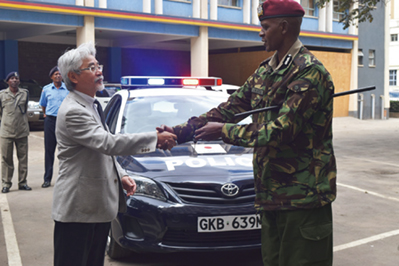
Handover ceremony for the presentation of 15 police cars and two motorbikes to the National Police Service of Kenya (Photo: Kumiko Shibaoka / Embassy of Japan in Kenya)
The restoration of public safety and governance is extremely important when it comes to providing seamless assistance that spans from conflict resolution to recovery, reconstruction and nation-building. In this regard, Japan provides assistance of Disarmament, Demobilization and Reintegration (DDR) of ex-combatants so that countries involved in conflict can consolidate peace and do not return to a state of conflict. Additionally, Japan is working on efforts to ensure domestic safety and security, to restore government functions, through the restoration of administrative systems and electoral reforms and to strengthen administrative, judicial, and police functions. (For details on electoral reform, refer to (3) Assistance for Democratization.)
•Clearance of Landmines, Unexploded Ordnance, and Collection of Small Arms
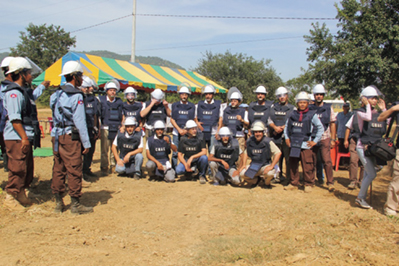
Transfer of knowledge and technology cultivated by the Cambodian Mine Action Centre, which Japan has supported for many years, to a mine action organization from Iraq, where there is a high level of landmine pollution
In post-conflict countries, unexploded ordnance (UXO) and anti-personnel landmines remain, and illicit small arms and light weapons are widespread. The explosive remnants of war harm civilians indiscriminately. Not only do they hinder reconstruction and development activities, they are also a cause of new conflicts. It is important to provide support towards stabilizing communities and ensuring security in the affected countries, through such assistance as the clearance of UXOs and landmines, the appropriate management of small arms, and capacity building for landmine victims.
As a state party to the Convention on the Prohibition of the Use, Stockpiling, Production and Transfer of Anti-Personnel Mines and on their Destruction, as well as the Convention on Cluster Munitions, Japan is steadily implementing international cooperation that straddles the areas of mine clearance, victim assistance, mine risk education and other projects, from the perspective of “Humanitarian, Development and Peace Nexus.”
For example, the Japan Mine Action Service (JMAS), an approved specified non-profit corporation, has helped to establish a new curriculum on demining skills at the Cambodian Mine Action Centre (CMAC) under the framework of the Grant Assistance for Japanese NGO Projects since 2014, which leads to enriching a solid footing for training on landmine clearance. Furthermore, CMAC demining platoons participating in this curriculum are engaged in efforts to disseminate the technical expertise on mine clearance throughout Cambodia and abroad.
In Afghanistan, the Association for Aid and Relief, Japan (AAR Japan), another specified non-profit corporation, provides outreach education to raise awareness on the dangers of landmines, UXOs and other remnants of conflict, and on the proper ways of avoiding them. Since FY2009, through the Grant Assistance for Japanese NGO Projects and JPF,(Note 20) AAR Japan has conducted Mine Risk Education (MRE) in various parts of Afghanistan through means such as the development of teaching materials and training seminars. The organization has also trained local people to conduct MRE themselves. Through such activities, education and awareness-raising activities for the local people are in progress.
In addition, from 2015 onwards, Japan has provided support through UNICEF for outreach education on landmine risk prevention in Palestine, Yemen, Central African Republic, Chad, South Sudan, Iraq, and Ukraine.
Furthermore, for Laos, which has particularly endured great suffering from UXO, Japan has mainly carried out the dispatch of UXO experts, provision of equipment, and South-South cooperation. Since 2014, Japan has also supported capacity building for organizations that dispose of UXOs. In addition, since 2015, Japan has carried out the mechanization of shrub removal and development of forward outposts in Sekong Province, Salavan Province and Champasak Province, all of which are poor regions that have endured particularly great suffering from UXO. Japan also supports land development after the clearance of UXO.
In 2017, Japan has supported mine action, including removal of a landmines and UXO, risk education, through the United Nations Mine Action Service (UNMAS) in Middle East and African countries including Iraq and South Sudan. Additionally, through the Japan-UNDP Partnership Fund, Japan has been providing support for a training project to manage small arms for officials from security agencies in Liberia, conducted by the Kofi Annan International Peacekeeping Training Centre in Ghana.
To tackle the proliferation of small arms and light weapons, Japan provides support for the collection, disposal, and appropriate stockpile management, in combination with development assistance. With a view to improving security as well as strengthening the capacity to manage and control the import and export of arms, Japan also supports the development of relevant legal systems on arms control, capacity building of customs agencies, police forces and other law enforcement agencies, and support for conducting DDR projects for ex-combatants and former child soldiers.
•Human Resources Development for Peacebuilding
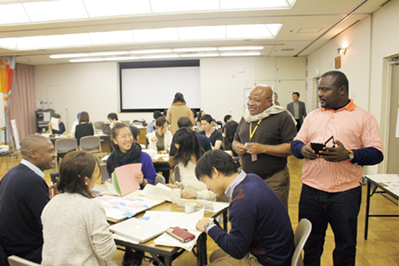
A training session held in Japan as part of the “Primary Course” program for human resources development (Photo: Hiroshima Peacebuilders Center)
Required qualities for peacebuilding activities and those that are engaged in such activities are becoming more diverse and more complex. In response to these needs, Japan has conducted the Program for Human Resource Development for Peacebuilding from FY2007 to FY2014 to train civilian experts from Japan and other regions so that they can play an active role in the field. Pillars of the Primary Course program consist of coursework in Japan, where participants acquire the practical knowledge and skills required for the peacebuilding field; the overseas assignment, where participants work at local offices of international organizations in the peacebuilding field; and support for graduates to build up their careers. Since FY2015, the contents of the program have been expanded to the “Program for Global Human Resource Development for Peacebuilding and Development.” In addition to the existing Primary Course, the Mid-Career Course and the Career Support Seminar are also being conducted. Many of the graduates are currently playing an active role in the fields of peacebuilding and development in countries such as South Sudan, Jordan, and Israel.
A. Mindanao Peace Process
The conflict in the Mindanao region in the southern Philippines has lasted for 40 years, but a comprehensive peace agreement was signed in 2014.
Under this agreement, during the transition process until the inauguration of the new autonomous government (Bangsamoro(Note 21)), the Bangsamoro Basic Law is to be enacted, a referendum is to be held, and a transitional governing entity is to be established. At the same time, the smooth implementation of various processes that are expected to contribute to the “normalization” of the situation is also a challenge. These include the disarmament of MILF forces, the social reintegration of combatants, the dismantlement of the many private armed groups in the area, the restoration of security through the creation of a new police organization, and the promotion of socio-economic development that has lagged behind due to the conflict.
The key to achieving true peace in Mindanao is the steady execution of the peace agreement and the overcoming of the hurdles. This requires the unremitting efforts of the Philippine government and MILF, as well as the support of the international community including Japan.
<Japan's Efforts>
Japan has dispatched development experts from JICA to the Social and Economic Development Section of the International Monitoring Team (IMT) and conducted studies to identify the needs for assistance. This has led to Japan's assistance for the development of elementary schools, wells, clinics, and vocational training centers. Japan has also carried out development cooperation projects intensively in former conflict areas, including Grant Assistance for Grass-Roots Human Security Projects. These measures, which are known under the name of the “Japan-Bangsamoro Initiatives for Reconstruction and Development (J-BIRD),” have been highly praised by the local people and the Philippine government. In 2011, the first leaders' meeting between then President Benigno S. Aquino III and MILF Chairman Al Haj Murad Ebrahim took place in Narita by the intermediation of Japan. This meeting helped establish mutual trust towards the resolution of the Mindanao peace issue.
In 2014, JICA organized a seminar of the Consolidation for Peace for Mindanao Seminar in Hiroshima City. With then President Aquino in attendance, officials including MILF Chairman Murad and Secretary Teresita Quintos-Deles of the Office of the Presidential Adviser on the Peace Process (OPAPP) participated in the seminar and stated their resolve towards moving the peace process forward. On this occasion, the Government of Japan announced the transition to the framework of “J-BIRD 2” with a greater focus on securing the economic independence of the Bangsamoro region. In March 2017, Japan decided to provide grant aid towards projects such as the supply of equipment for the development of power distribution in the Bangsamoro region and peacebuilding and the education support for children who have been affected by the conflict in Mindanao. Furthermore, in November 2017, Japan decided to provide equipment towards the reconstruction of Marawi City on the island of Mindanao, which had been catastrophically destroyed in the armed conflict. For the achievement of true peace in Mindanao, Japan continues to expand and strengthens its support in such areas as: construction of schools, clinics, wells, and other facilities; human resource development in the transition process; and economic development towards sustainable development (cooperation that focuses on agriculture, mining and manufacturing, infrastructure development, etc.).
In addition, Japan supports the peacebuilding process undertaken by Japanese NGOs using the Grant Assistance for Japanese NGO Projects.
B. Assistance to Afghanistan and Pakistan
The security situation in Afghanistan continues to be adverse due to repeated attacks by anti-government forces such as the Taliban. On May 31, a large-scale terrorist attack occurred in the capital Kabul, causing over 300 casualties. The National Unity Government (NUG) of President Ashraf Ghani, which was inaugurated in 2014, has gained the support of the international community and has moved forward with corruption countermeasures and governance reform as part of its reform efforts towards the self-reliance and stability of the nation. It is scheduled to hold Parliament and District Council elections in October 2018 and a Presidential Election in 2019. The NUG brought together key countries and neighboring countries for a “Kabul Process Conference” where discussions were held in order to share common recognition among the regions, with the aim of making progress with peace between the Afghanistan government and anti-government forces. In August the same year, U.S. President Trump announced a new strategy in Afghanistan and South Asia, indicating the continued involvement of the U.S. in Afghanistan. To prevent Afghanistan and Pakistan from stepping back into a hotbed of terrorism, Japan has proactively provided support to both countries while working closely with the international community. Stability in Pakistan is vital not only for the peace and stability of its neighboring countries including Afghanistan, but also for the world as a whole. Japan provides various forms of assistance to Pakistan in the fields of counter-terrorism measures and the civilian sector.
<Japan's Efforts>
•Afghanistan
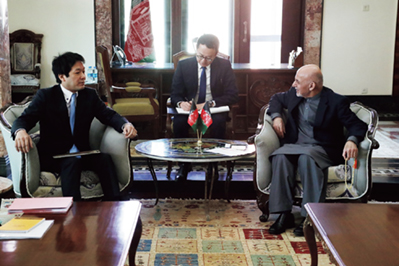
Then State Minister for Foreign Affairs Kentaro Sonoura paid a courtesy call to President Mohammad Ashraf Ghani and exchanged views with the President on a visit to Kabul, the capital of Afghanistan, in January 2017.
Japan has consistently extended assistance to Afghanistan. Japan's assistance to Afghanistan since 2001 totals approximately $6.4 billion (as of beginning of October 2017). Japan, as one of the major donor countries for Afghanistan, has been endeavoring to coordinate its assistance with the government of Afghanistan and other donor countries and organizations.
Japan and Afghanistan jointly held the Tokyo Conference on Afghanistan in 2012. The conference, attended by representatives of about 80 countries and international organizations, issued an outcome document titled “The Tokyo Declaration.” At the conference, the Tokyo Mutual Accountability Framework (TMAF) was established to clarify the mutual commitment between Afghanistan and the international community for the sustainable development of Afghanistan, and to regularly monitor and review the commitment. On that occasion Japan announced that it would provide up to approximately $3 billion of assistance to Afghanistan in about five years from 2012 in the fields of development and enhancement of security capabilities and has since steadily implemented this assistance.
The Brussels Conference on Afghanistan held in 2016 was an important opportunity to renew the existing mutual commitments between the international community and the Government of Afghanistan, and Japan expressed its intention to provide assistance worth up to ¥40 billion per year for four years from 2017 to the end of 2020, and strongly urged Afghanistan to make efforts towards further reform commitments.
In order to support Afghanistan's efforts towards security self-reliance and stability, Japan's current support priorities are in the security field on capacity building of the police force and in the development field of agriculture, human resource, and transportation infrastructure.
•Pakistan
Japan has been actively engaged in assisting Pakistan since the country announced its intention to fight against terrorism in cooperation with the international community following the terrorist attacks in the United States in 2001. To contribute to improving the security situation in Pakistan, Japan has provided assistance for education, health, vocational training, and other projects in the Pakistan-Afghanistan border area, and supported Pakistan's efforts for stability of people's lives.
In February 2017, Japan provided grant aid of ¥500 million to Pakistan for the procurement of equipment that contribute to counter-terrorism efforts.
C. Middle East Peace (Palestine)
The Palestine issue is at the core of the Arab-Israeli conflict that has continued for more than half a century. Middle East peace is an issue that wields significant impact on the stability and prosperity of Japan and the rest of the world. Japan supports a two-state solution whereby Israel and a future independent Palestinian state live side by side in peace and security.
Many years of occupation have made Palestine economically dependent on the Israeli economy as well as on assistance from the international community. Furthermore, the unemployment rate has not fallen due to Israel's occupation policy including restrictions on movement as well as a sluggish economy, and a severe humanitarian situation remains in place, particularly in the sealed-off Gaza Strip. To realize a two-state solution, it is an important challenge to improve living conditions for the Palestine people so that an independent Palestine can become a sustainable nation in the future and help the Palestinian economy stand independently.
<Japan's Efforts>
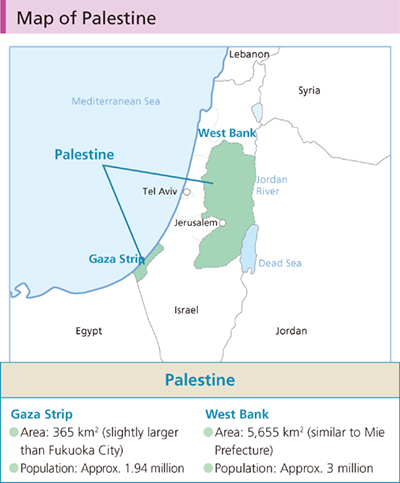
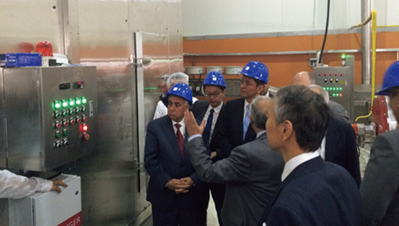
Then State Minister for Foreign Affairs Nobuo Kishi inspecting the Jericho Agro-Industrial Park (JAIP) in Palestine in April 2017
Japan has positioned its assistance to the Palestinians as one of the important pillars of its measures to contribute to the Middle East Peace Process. In particular, Japan has provided more than $1.8 billion in assistance to Palestine since the 1993 Oslo Accords. Specifically, Japan provides various types of humanitarian assistance through international organizations and NGOs to improve the severe living conditions of the socially vulnerable people in the West Bank (including East Jerusalem), people affected by conflicts in the Gaza Strip, and others. Also, Japan proactively supports the Palestinian Authority to stabilize and improve its people's lives, strengthen the financial foundation, enhance the administrative and financial capacity, and promote economic self-reliance. These efforts are aimed at preparing for future Palestinian nation-building and for a self-sustained Palestinian economy.
Furthermore, since 2006, Japan has launched the initiative of the “Corridor for Peace and Prosperity” as its unique medium- to long-term initiative that aims to promote socio-economic development in the Jordan Valley area through regional cooperation among Japan, Israel, Palestine and Jordan. Those four parties are working on the flagship project of the initiative, the development of the Jericho Agro Industrial Park (JAIP).
In 2013, Japan launched a new initiative called the “Conference on the Cooperation among East Asian Countries for Palestinian Development (CEAPAD)” to help Palestine achieve economic independence by drawing on Asia's experience on human resources development and private economic development. To date, meetings have been held on triangular cooperation(Note 22) for human resources development and on trade and investment expansion.
In 2015, Prime Minister Abe visited Palestine, where he met with President Mahmoud Abbas and conveyed that Japan would extend approximately $100 million in assistance to aid reconstruction in Gaza, socio-economic development, finance, and medical and health care, among other areas.
In 2016, when President Abbas visited Japan, Prime Minister Abe conveyed that Japan would extend assistance of more than $78 million, and President Abbas expressed his utmost gratitude.
Also, at the Ministerial Meeting of the Ad hoc Liaison committee (AHLC) on Palestine, which was held to discuss assistance for Palestine at the United Nations in September 2017, Foreign Minister Kono attended and announced assistance providing approximately $20 million to Palestine as well as expansion of the abovementioned “Corridor for Peace and Prosperity” initiative.
D. Sahel Region
The “Sahel(Note 23) countries” generally include the following eight countries – Mauritania, Senegal, Mali, Burkina Faso, Niger, Nigeria, Cameroon and Chad, although there is no strict definition.
In the Sahel region, which has vast lands, including deserts, because of natural disasters including drought, poverty, and fragile state system, political uncertainty, terrorism, illicit trade of arms and illegal drugs, and the threats of organized crimes such as kidnapping are becoming ever more serious. Moreover, countries in the Sahel region have difficulties in controlling their borders sufficiently to prevent the entry and exit of terrorists and others, and they have also become breeding grounds for arms smuggling. Under these circumstances, it is necessary for the region and the international community to enhance security capacity and governance in the entire Sahel region, as well as to address development issues and cope with humanitarian crises such as refugees.
<Japan's Efforts>
Following the terrorist attack against Japanese nationals in Algeria(Note 24) in 2013, then Foreign Minister Kishida announced the three pillars of foreign policy.(Note 25) Furthermore, in 2015, Japan announced three new pillars of its diplomatic policy(Note 26) for the future, following the hostage crisis in Syria in which Japanese nationals were killed, and Japan has been accelerating its efforts to bring peace and stability to the Sahel region.
Since 2008, Japan has provided an accumulated amount of $405 million to the Peace Keeping School (L'ecole de Maintien de la Paix) in Mali, and also provided in renovating its National Police Academy in 2015. In addition, Japan has supplied equipment to the security and judicial authorities of Mali.
Moreover, Japan has implemented projects which contribute to peace and stability in the Sahel region such as border control to enhance stability and human security in the region, countermeasures against radicalization of the youth, and awareness-raising for civil rights.
These projects are expected to strengthen the capacity of border control so as to prevent young people from turning to violent extremism, improve public safety, reduce the potential threat of terrorism in the Sahel countries, and thus improve the capability of the whole region to cope with these challenges.
The MOJ, through UNAFEI, organized a training program for criminal justice practitioners in French-speaking African countries, titled the Fourth Training on Criminal Justice in French-speaking African Countries. This program focused on themes such as the importance of capacity in the areas of investigations, legal actions, and trials, as well as measures to combat crimes committed through the use of computer networks. This training contributed to finding a solution for global challenges such as the deteriorating security situation and the serious issues of corruption in this region through the enhancement and development of the criminal justice system in French-speaking African countries.
Japan will work more closely with countries in the Sahel region, international organizations, and other aid organizations to steadily provide assistance towards establishing peace and stability in the Sahel region.
E. South Sudan
In 2016, clashes broke out in Juba, the capital of South Sudan, between the faction supporting President Kiir and the faction supporting First Vice President Machar, and security in Juba rapidly deteriorated. As a result, Japanese nationals including JICA staff were evacuated from the country. Subsequently, the capital Juba became relatively calm, but regions remain volatile due to clashes between the government forces and the opposition forces, as well as incidents of armed robbery. The country is faced with multiple remaining challenges.
<Japan's Efforts>
Peacebuilding is one of the priorities of Japan's diplomacy towards Africa. In particular, stability in Sudan and South Sudan is directly related to the stability of the whole African continent. The two countries are therefore an area in Africa requiring intensive assistance for the consolidation of peace. With this understanding, Japan has provided assistance amounting to over $1.5 billion to Sudan and South Sudan since 2005.
Japan is providing assistance to South Sudan aimed at consolidating peace, as well as support in the areas of basic human needs (BHN)(Note 27) so that the people of the country can actually feel that peace has been established and that the country will not revert to conflict. Japan also provides assistance that focuses on the development of infrastructure and governance.
In March 2017, Japan announced its intention to contribute proactively to South Sudan's nation-building, through continued and enhanced assistance. The assistance for South Sudan includes: support towards advancement of the political process such as support for activities to monitor the implementation of ARCSS (Agreement on the Republic of the Conflict in South Sudan) through the Inter-Governmental Authority on Development (IGAD), a regional institution in East Africa; support for national dialogues including assistance to facilitate the participation of various organizations in South Sudan, such as religious and youth organizations, in dialogue; human resources development such as support to build the financial management capabilities of civil servants and support to enhance police capabilities; and humanitarian support including food assistance. In May 2017, the Engineering Units of the Japan Self-Defense Force (JSDF) dispatched to the United Nations Mission in the Republic of South Sudan (UNMISS) for more than five years concluded its activities; however, Japan continues its contribution to UNMISS activities through dispatch of staff personnel (as of November 2017).
- Note 20: Japan Platform (JPF) is an organization launched by NGOs, business communities, and the Government of Japan in August 2000 in order for Japanese NGOs to carry out expedient and effective emergency humanitarian assistance in response to conflict or natural disasters.
- Note 21: “Bangsamoro” is the name that Islamic rebel groups use to refer to themselves.
- Note 22: Refer to here for an explanation on South-South cooperation.
- Note 23: “Sahel” is a semi-arid region that stretches along the southern edge of the Sahara Desert. It generally refers to West Africa; however, in some cases it includes Sudan and the Horn of Africa area. The word “Sahel” originates from “coast” in Arabic. The Sahel countries are also called the countries on the southern edge of the Sahara Desert.
- Note 24: This is an incident in which an armed group attacked a natural gas plant in the Tiguentourine area in eastern Algeria and barricaded the inside of the plant, taking the workers and other people as hostages. The Algerian military forces managed to control the situation by January 19. However, 40 people died, including 10 Japanese nationals.
- Note 25: The three pillars are: (i) Strengthening of measures against international terrorism; (ii) Support for the stabilization of Sahel, North Africa, and Middle East regions in the southern part of the Sahara Desert; and (iii) Promotion of dialogue and exchange with Islamic and Arab countries.
- Note 26: The three pillars are: (i) Strengthening counter-terrorism measures; (ii) Enhancing diplomacy towards stability and prosperity in the Middle East; and (iii) Assistance in creating societies resilient to radicalization.
- Note 27: Basic human needs are the minimum requirements of human life, including clothing, food, shelter, and education.
